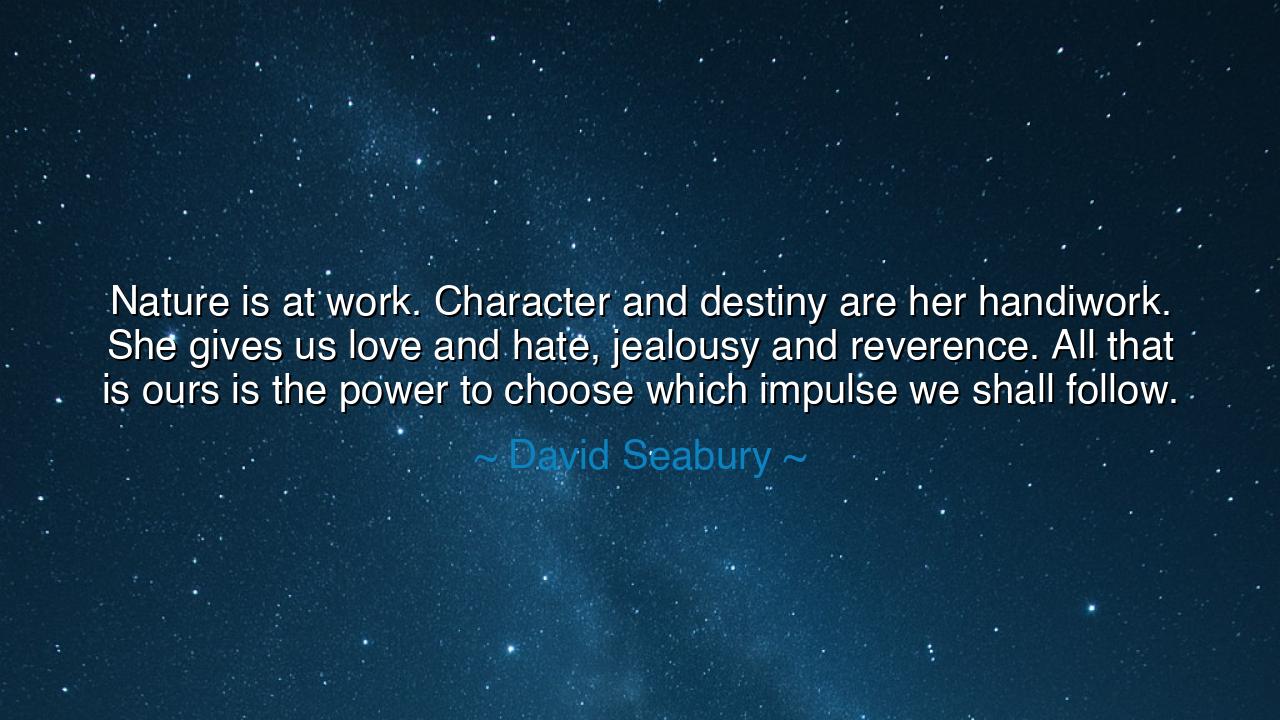
Nature is at work. Character and destiny are her handiwork. She
Nature is at work. Character and destiny are her handiwork. She gives us love and hate, jealousy and reverence. All that is ours is the power to choose which impulse we shall follow.






There is a quiet majesty in the words of David Seabury, the psychologist and philosopher of human will, who once declared: “Nature is at work. Character and destiny are her handiwork. She gives us love and hate, jealousy and reverence. All that is ours is the power to choose which impulse we shall follow.” In this truth lies the eternal tension of mankind—the struggle between what is given and what is chosen, between the forces that shape us and the will that defines us. Seabury speaks as one who understood the dual craftsmanship of existence: that Nature creates the clay of our being, but we are the sculptors who give it form.
The quote begins with the solemn reminder that “Nature is at work.” She never sleeps, nor rests, nor ceases in her labor. She molds every soul in the furnace of life, gifting each person both light and shadow. Within us all are the seeds of virtue and the seeds of vice—the power to build or to destroy, to love or to hate. Character and destiny, Seabury tells us, are her tools—gifts of design and consequence. Nature shapes the foundation, but it is choice that raises the structure. Our lives, then, are not ruled by the stars or by birth, but by the countless decisions that steer the impulses within us.
It is a humbling thought: that the same Nature who gives us love also gives us hate; that from the same heart springs jealousy and reverence. These are not contradictions, but twin rivers flowing from a single source. The wise man does not curse his darker impulses, nor pretend they do not exist; he recognizes them as the raw materials of his soul. The weak man follows them blindly; the strong man masters them. This, Seabury suggests, is the true measure of freedom—not in the absence of temptation, but in the ability to choose rightly amid its storm.
Consider the story of Marcus Aurelius, the philosopher-emperor of Rome. Surrounded by treachery, war, and betrayal, he was tempted daily by rage and despair. Yet he wrote, in his Meditations, “You have power over your mind—not outside events. Realize this, and you will find strength.” Marcus understood, as Seabury did, that Nature provides the impulses, but we govern the will. Though born to rule by blood, he ruled himself by choice. His greatness did not come from power, but from discipline—the power to direct the forces within him toward wisdom and peace. Thus, he stood as proof that destiny is not what happens to us, but what we choose to do with what happens.
Seabury’s words reveal that the battlefield of life lies not in the world around us, but in the realm of our own hearts. The impulses of love, hate, jealousy, and reverence are not enemies, but energies. Each can either build a temple or destroy it. Love without control becomes obsession. Hate without awareness becomes cruelty. Jealousy can poison the heart, yet when understood, it may teach humility. Reverence can uplift, yet if misplaced, can enslave. The secret of the wise is to harness these forces, turning nature’s chaos into the harmony of character.
What Seabury calls “the power to choose” is the greatest inheritance of humankind. Every day, the universe places before us two paths: one of reaction and one of reflection. Those who live by impulse become servants of fate; those who live by choice become masters of it. The beasts of the field obey instinct; only man can defy it. And that defiance, that sacred ability to direct our passions rather than be devoured by them, is what makes us divine among creation. For in every decision we make, we shape not only our character—but our destiny.
Let the young and the wise alike remember this: Nature gives us the tools, but the soul gives them purpose. Do not curse your emotions—they are proof of life. But temper them, as the blacksmith tempers steel, until they serve righteousness instead of ruin. When anger rises, choose patience. When envy stirs, choose gratitude. When hate calls, choose compassion. For though Nature works in you, it is your choice that writes the final word of your story.
And so, David Seabury’s teaching endures as a lamp for every seeker: you cannot escape your nature, but you can govern it. Destiny is not written in the stars, but forged in the furnace of your own will. To live wisely, then, is to stand as both child and master of Nature—honoring her gifts, mastering her impulses, and choosing, each day, the higher path. For while Nature shapes the clay, it is the soul’s courage to choose that breathes it into life.






AAdministratorAdministrator
Welcome, honored guests. Please leave a comment, we will respond soon